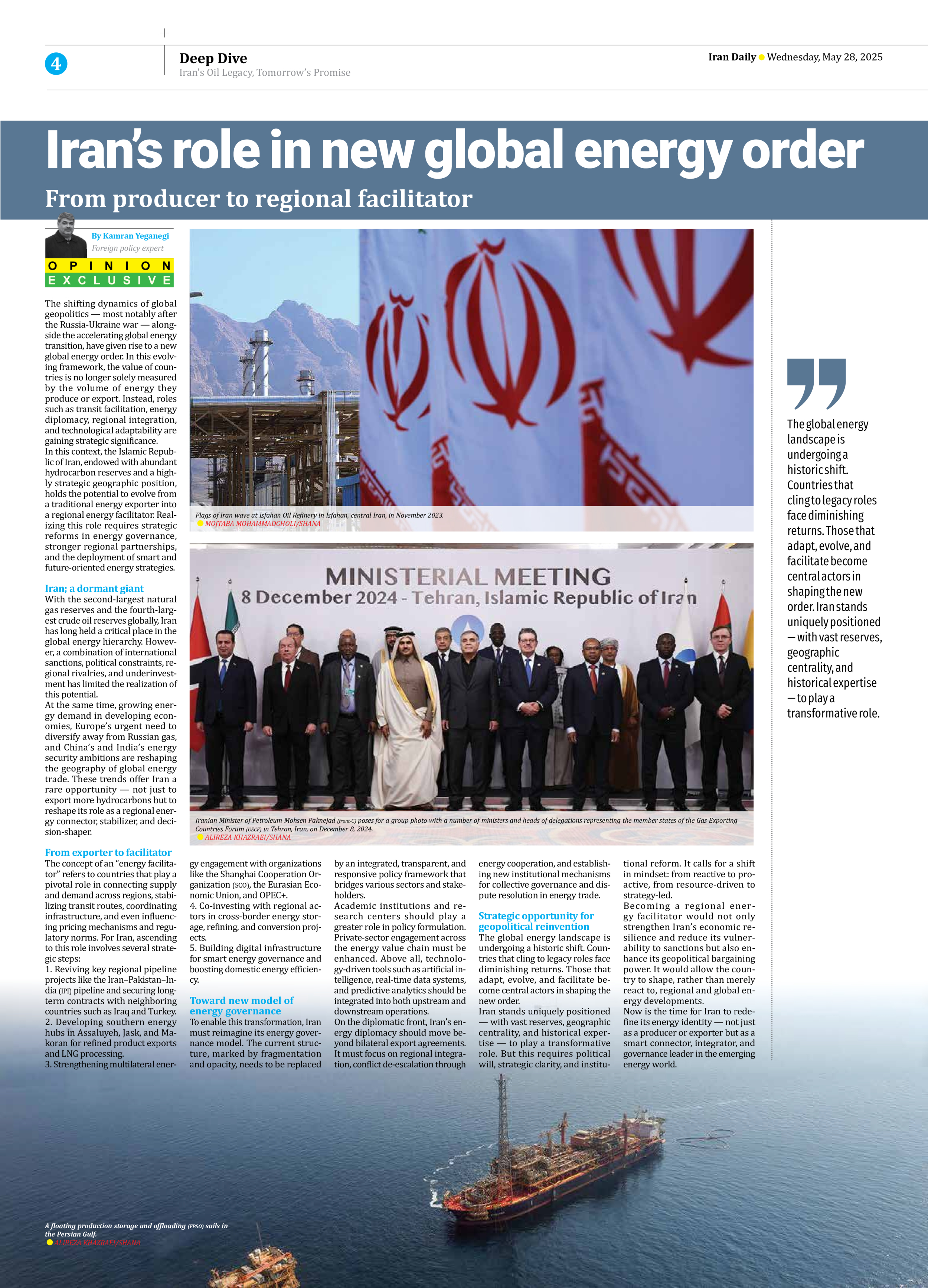
Iran’s role in new global energy order
From producer to regional facilitator
By Kamran Yeganegi
Foreign policy expert
The shifting dynamics of global geopolitics — most notably after the Russia-Ukraine war — alongside the accelerating global energy transition, have given rise to a new global energy order. In this evolving framework, the value of countries is no longer solely measured by the volume of energy they produce or export. Instead, roles such as transit facilitation, energy diplomacy, regional integration, and technological adaptability are gaining strategic significance.
In this context, the Islamic Republic of Iran, endowed with abundant hydrocarbon reserves and a highly strategic geographic position, holds the potential to evolve from a traditional energy exporter into a regional energy facilitator. Realizing this role requires strategic reforms in energy governance, stronger regional partnerships, and the deployment of smart and future-oriented energy strategies.
Iran; a dormant giant
With the second-largest natural gas reserves and the fourth-largest crude oil reserves globally, Iran has long held a critical place in the global energy hierarchy. However, a combination of international sanctions, political constraints, regional rivalries, and underinvestment has limited the realization of this potential.
At the same time, growing energy demand in developing economies, Europe’s urgent need to diversify away from Russian gas, and China’s and India’s energy security ambitions are reshaping the geography of global energy trade. These trends offer Iran a rare opportunity — not just to export more hydrocarbons but to reshape its role as a regional energy connector, stabilizer, and decision-shaper.
From exporter to facilitator
The concept of an “energy facilitator” refers to countries that play a pivotal role in connecting supply and demand across regions, stabilizing transit routes, coordinating infrastructure, and even influencing pricing mechanisms and regulatory norms. For Iran, ascending to this role involves several strategic steps:
1. Reviving key regional pipeline projects like the Iran–Pakistan–India (IPI) pipeline and securing long-term contracts with neighboring countries such as Iraq and Turkey.
2. Developing southern energy hubs in Assaluyeh, Jask, and Makoran for refined product exports and LNG processing.
3. Strengthening multilateral energy engagement with organizations like the Shanghai Cooperation Organization (SCO), the Eurasian Economic Union, and OPEC+.
4. Co-investing with regional actors in cross-border energy storage, refining, and conversion projects.
5. Building digital infrastructure for smart energy governance and boosting domestic energy efficiency.
Toward new model of energy governance
To enable this transformation, Iran must reimagine its energy governance model. The current structure, marked by fragmentation and opacity, needs to be replaced by an integrated, transparent, and responsive policy framework that bridges various sectors and stakeholders.
Academic institutions and research centers should play a greater role in policy formulation. Private-sector engagement across the energy value chain must be enhanced. Above all, technology-driven tools such as artificial intelligence, real-time data systems, and predictive analytics should be integrated into both upstream and downstream operations.
On the diplomatic front, Iran’s energy diplomacy should move beyond bilateral export agreements. It must focus on regional integration, conflict de-escalation through energy cooperation, and establishing new institutional mechanisms for collective governance and dispute resolution in energy trade.
Strategic opportunity for geopolitical reinvention
The global energy landscape is undergoing a historic shift. Countries that cling to legacy roles face diminishing returns. Those that adapt, evolve, and facilitate become central actors in shaping the new order.
Iran stands uniquely positioned — with vast reserves, geographic centrality, and historical expertise — to play a transformative role. But this requires political will, strategic clarity, and institutional reform. It calls for a shift in mindset: from reactive to proactive, from resource-driven to strategy-led.
Becoming a regional energy facilitator would not only strengthen Iran’s economic resilience and reduce its vulnerability to sanctions but also enhance its geopolitical bargaining power. It would allow the country to shape, rather than merely react to, regional and global energy developments.
Now is the time for Iran to redefine its energy identity — not just as a producer or exporter but as a smart connector, integrator, and governance leader in the emerging energy world.







